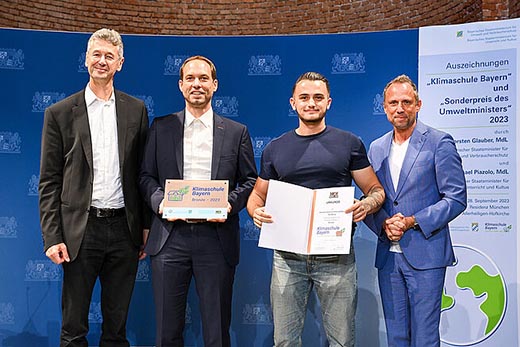Koenig & Bauer Vocational School Recognized as Bavarian Climate School
Press release from the issuing company

Michael Piazolo, Bavarian State Minister for Education and Culture (left), and Thorsten Glauber, Bavarian State Minister for Environment and Consumer Protection (right), hand over the Bavarian Climate School award to Manuel Eisenmann, head of the Koenig & Bauer vocational school (2nd from left), and Moritz Bär from the youth and trainee representation of Koenig & Bauer in Würzburg (2nd from right).
© Koenig & Bauer, Tobias Hase
Award for successful CO2 savings in school operations
- Koenig & Bauer Würzburg vocational school receives certificate at the bronze certification level
- Sustainable design of the future should be made tangible for students
The Koenig & Bauer vocational school in Würzburg will in future be part of the climate schools in Bavaria. The award recognizes schools that organize their school operations sustainably and gradually realize CO2 savings. At the same time, a climate school should give its students skills to shape the future sustainably and make climate-friendly actions tangible.
School principal Manuel Eisenmann received the bronze certification level certificate at an award ceremony on September 28, 2023 in Munich from Michael Piazolo, Bavarian State Minister for Education and Culture, and Thorsten Glauber, Bavarian State Minister for the Environment and Consumer Protection. This means that the Koenig & Bauer vocational school, along with 50 other schools from Bavaria, will now be considered a climate school.
The first step on the way to becoming a certified climate school is determining the school-specific CO2 footprint. This is followed by the creation of a climate protection plan in which concrete climate protection measures are recorded. With their help, the determined CO2 footprint should be gradually reduced in the following years.
The project involves teachers and students equally. Potential savings are identified and implemented in a total of eight fields of action (waste, purchasing, nutrition, communication & networking, compensation & carbon sequestration, mobility, electricity, heat).
- Questions to ask about inkjet for corrugated packaging
- Can Chinese OEMs challenge Western manufacturers?
- The #1 Question When Selling Inkjet
- Integrator perspective on Konica Minolta printheads
- Surfing the Waves of Inkjet
- Kyocera Nixka talks inkjet integration trends
- B2B Customer Tours
- Keeping Inkjet Tickled Pink
© 2024 WhatTheyThink. All Rights Reserved.














